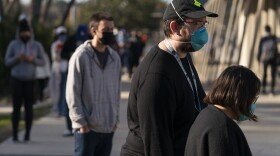
Jane Greenhalgh
Jane Greenhalgh is a senior producer and editor on NPR's Science Desk.
She produces the weekly Health segment on NPR's Morning Edition and writes and edits for NPR's health blog, "Shots." Greenhalgh also produces stories on science, health, and global health across NPR's many platforms.
Greenhalgh was part of the team of broadcast, digital, and multimedia journalists who produced the 2015 award-winning series "#15Girls," which examined the struggles teenage girls face throughout the developing world. Greenhalgh's story "Banished to the Shed" was one of NPR's most listened to and viewed stories of 2015.
She has twice won The American Association for the Advancement of Science award: In 2020 for her work on Victoria's Story: Gene editing helps people with sickle cell, and for NPR's 2014 series "The human microbiome: guts and glory." Greenhalgh also won The National Academies of Science Communication award in 2014, and she was part of the digital team which won for the 2009 series Climate Connections. She traveled extensively for this year-long, multi-platform project, examining how climate change is affecting people across the globe. From Timbuktu, where the desert nomads are giving up their way of life, to Peru, where potato farmers are moving their crops higher up the mountain, and to Bangladesh, where scientists are experimenting with drought and flood resistant rice, the stories Greenhalgh produced chronicled the impact of climate change.
Greenhalgh has traveled extensively covering health issues in developing countries, including cholera in Haiti, polio in Indonesia, tuberculosis in Kenya, AIDS in India, malaria in the Gambia, malnutrition in Bolivia, and menstrual health in Nepal.
-
Updated versions of the mRNA vaccines roll out this week. Experts say they offer good protection against current COVID variants. Who should get them, and when's the best time to roll up your sleeve?
-
The rate at which women in the U.S. are dying from pregnancy related causes more than doubled in recent decades. A new study, published in JAMA shows Black women and Native Americans are most at risk.
-
Much of the Northeast U.S. is blanketed in a murky haze of wildfire smoke. For most people breathing this air is unpleasant, for others it can be life-threatening. There are ways to reduce the risk.
-
Toxic metal can be harmful to developing brains. New lead targets are part of a broad FDA imitative to reduce children's exposure to the lowest levels possible.
-
CDC Director Rochelle Walensky has signed off on updated versions of the Moderna and Pfizer-BioNTech vaccines that target the original virus and the omicron subvariants.
-
Those who contracted COVID-19 can end their isolation after five days while continuing to wear a well-fitting mask for an additional five days, according to the agency.
-
Moderna submitted data from 344 volunteers who got a third shot of the vaccine six months after their first two doses. The additional shot significantly boosted immunity, the company said.
-
People with weakened immune systems who already got two doses of the Pfizer or Moderna COVID-19 vaccines can now get a third shot. But exactly who is eligible? Here's what we know so far.
-
The CDC says COVID-19 was the largest factor, along with drug overdoses, homicides, diabetes and chronic liver disease. The decline was even greater for Hispanic men.
-
The FDA has authorized storing the Pfizer-BioNTech COVID-19 vaccine at refrigerator temperatures for up to a month. Previously the vaccine could only be kept in a regular fridge for up to 5 days.










